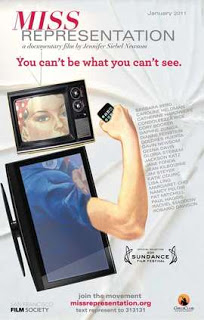 |
| Miss Representation (2011) |
I love the tagline for this movie: “You can’t be what you can’t see.” That idea is very similar to the driving force for this site–the way women are represented in film, television, and media in general has a dramatic effect on how women are actually perceived in our culture. The (mis)representation of women directly contributes to the inequality of women and to violence against women. It’s no coincidence that in a culture where women are systematically devalued in media, we have abysmally low numbers of women in positions of power (women represent only 17% of Congress, making the U.S. “90th in the world in terms of women in the national legislature”).
Here are some stats from the movie worth considering:
- At age 7, and equal number of boys and girls state that they want to be President of the United States. At age 15, this is no longer the case.
- The 2010 mid-term election is the first time since 1979 that women haven’t made gains.
- Women comprise only 16% of all writers, directors, producers, cinematographers, and editors.
- Teenagers in the U.S. consume 10 hours and 45 minutes of media (television, Internet, music, movies, magazines) every day.

Miss Representation rocks. Not only does it deal with the way women are portrayed in films and media—both in front of the camera and behind the scenes—it also touches on how important it is to understand that the sexualization of young girls also harms boys, by warping their ideas of women’s roles in our society, and what we’re ultimately supposed to value in women and girls. This shit starts early. And by the time these youngsters enter school, they’ve already internalized what constitutes acceptable behavior from men and women in our culture. Miss Representation perfectly balances raw data and statistics with testimony from young girls, media professionals, and activists—and I have to say, watching a young girl talk about the pressure she feels to conform to unattainable beauty standards, with tears streaming down her face, should be a pretty big wake up call for anyone who hasn’t much considered the impact of the media, including film, television, journalism, and music videos.
It’s very important to note how oppression of one people ends up oppressing the oppressors. Ralph Waldo Emerson pointed out this fact to President Van Buren with regard to our government’s treatment of the Cherokee. “We only state the fact that a crime is projected that confounds our understandings by its magnitude,–a crime that really deprives us as well as the Cherokees of a country, for how could we call the conspiracy that should crush these poor Indians, our Government, or the land that was cursed by their parting and dying imprecations, our country, any more?”
When our media fails young girls, it fails all of us. “You can’t be what you can’t see.” How very true on so many levels.